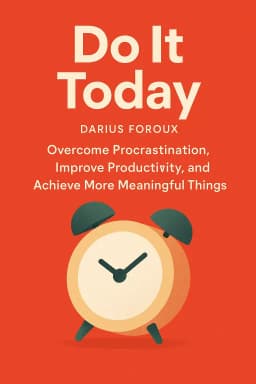
Beyond the Tomato Timer
Golden Hook & Introduction
SECTION
Mark: Okay, Michelle. "The Pomodoro Technique." Give it to me in five words. Michelle: Tomato timer saves your life. Mark: Nice. I'll go with: "Anxiety is optional, focus isn't." Michelle: Ooh, deep. My version is more practical. But I have to admit, I've always been a little skeptical of this one. It's everywhere. Productivity influencers, software developers, students... everyone talks about it. Mark: It’s one of those things that’s so popular it almost becomes a cliché. But today we’re diving into the book itself, The Pomodoro Technique by Francesco Cirillo. And what's wild is that Cirillo wasn't some productivity guru from the start. He was a university student in Italy in the late 80s, struggling to study for exams, who literally made a bet with himself that he could focus for just ten minutes using a tomato-shaped kitchen timer. Michelle: So this global productivity method was born out of pure student desperation? I love that. It feels so much more authentic than some consultant in a boardroom inventing a seven-step framework. Mark: Exactly. It wasn't born from a desire to optimize corporate efficiency; it was born from a desire to survive sociology exams. And that personal, psychological struggle is actually the key to the whole thing.
Winning the Psychological War with Time
SECTION
Michelle: Okay, so what was the struggle? I mean, we all procrastinate. We all feel the pressure of a deadline. What was so different about his situation? Mark: The book argues the problem isn't the deadline itself. It's our fundamental relationship with time. Cirillo makes this brilliant distinction between two ways we perceive time. The first is what he calls 'Becoming.' Michelle: 'Becoming'? That sounds very... philosophical for a book about a tomato timer. Mark: It is! 'Becoming' is time as this abstract, endless, oppressive river that's always flowing away from us. It's the clock on the wall, the calendar pages flipping. The French poet Baudelaire captured this perfectly when he wrote, "Time is a greedy player who wins without cheating, every round!" That feeling of being constantly defeated by time, that's 'Becoming.' It’s what generates anxiety. Michelle: I know that feeling. It's 3 PM, and you think about everything you haven't done, and you just feel this wave of dread. You're not even working, you're just... stewing in the awareness of passing time. Mark: Precisely. And the Pomodoro Technique’s first goal is to fight that. It replaces 'Becoming' with what Cirillo calls a 'Succession of Events.' Instead of an abstract, infinite resource you're losing, time becomes a series of concrete, finite, controllable blocks. You aren't fighting the whole day; you're just engaging with one 25-minute block. Michelle: That makes sense. It’s like instead of staring at a massive mountain you have to climb, you're just looking at the next 10 feet of path right in front of you. The mountain is still there, but it's not the thing you're focused on. Mark: That’s a perfect analogy. And that's why Cirillo’s first experience was so profound. When that first timer rang after his short study session, he didn't feel like he'd "beaten" time. He wrote that he felt an "unusual and unexplainable sense of calm." He had taken this huge, scary, abstract enemy and contained it in a small, ticking, predictable box. He wasn't a victim of time anymore; he was a partner with it. Michelle: Wow. Okay, so the 25-minute interval isn't just a random number. It's a psychological tool to reframe our entire perception of time. That's much deeper than I thought. Mark: It's the whole foundation. The book argues that most of our productivity problems aren't about a lack of tools, but a surplus of anxiety. By focusing on one Pomodoro, you're not trying to win the war, you're just trying to win this one small, manageable battle. And winning that one battle gives you the calm and motivation to fight the next one.
The Art of the Interruption: A Practical Defense System
SECTION
Michelle: Okay, so you've made friends with the clock. You've turned the scary mountain into a series of small steps. But what about the real enemy? My own brain. And my colleague, Sarah, who just loves to pop over and ask 'a quick question' that is never, ever quick. Mark: I think everyone has a Sarah in their life. And the book is brilliant on this. It acknowledges that a distraction-free utopia is a fantasy. The goal isn't to eliminate interruptions; it's to develop a practical martial art for handling them. The book splits them into two types: internal and external. Michelle: Let's start with internal. The enemy within. The sudden, desperate urge to check if that one actor was also in that other movie from 1997. Mark: Exactly. The book gives this great example of a writer, let's call him Mark, who is in the middle of a Pomodoro. After about 10 minutes, he gets this powerful urge to call his friend Carol about a concert. Instead of just giving in, he recognizes it as an internal interruption. He takes a piece of paper, jots down 'Call Carol,' and puts an apostrophe next to it on his to-do list to signify an interruption. Then he gets back to work. A few minutes later, he gets a craving for pizza. Same deal: he writes 'Order pizza' on his sheet and refocuses. Michelle: So you're saying I need to literally schedule an appointment with my pizza craving? 'Dear Brain, we can discuss pepperoni at 2:30 PM. Until then, please respect my focus time.' Mark: It sounds silly, but it's incredibly powerful! The book’s insight is that you’re not ignoring the urge; you're acknowledging it and deferring it. You’re telling your brain, "I hear you, that's a valid thought, and we will deal with it, just not right now." This act of writing it down gets it out of your head and onto paper, freeing up your mental RAM to return to the task. Michelle: I can see how that would work. It’s the mental equivalent of putting a pin in it. But what about the external ones? The Sarahs of the world? You can't just write 'Deal with Sarah' on a post-it note and expect her to disappear. Mark: For that, the book proposes a three-step strategy: Inform, Negotiate, and Call Back. Let's take the story of Sarah the employee, who is deep in a Pomodoro when her colleague Mark comes over. Instead of dropping everything, she politely says, "Mark, I'm in the middle of some focused work right now. Is it urgent?" Michelle: Ah, the urgency check. Crucial. Mark: Crucial. Mark the colleague says it can wait. So Sarah negotiates. "Great, I have a break in about 20 minutes. Can we talk then?" Mark agrees, and Sarah gets right back to her proposal. She protected the Pomodoro. She respected her own focus, but she also respected her colleague by scheduling a specific time to help him. Michelle: That's so simple but so effective. It’s a script. It gives you the words to say, so you're not fumbling and just giving in out of social pressure. But what if the interruption is urgent? What if your boss is at your desk and the building is metaphorically on fire? Mark: Then you void the Pomodoro. The book is very clear: a Pomodoro is indivisible. If you have to stop for a truly urgent matter, that Pomodoro doesn't count. You stop the timer, deal with the emergency, take a break, and then start a fresh Pomodoro later. The system is a tool to serve you, not a prison you're trapped in. The goal is to make the decision to interrupt a conscious one, not an automatic reflex.
The Pomodoro as a Team Sport: Scaling Focus
SECTION
Mark: And that idea of consciously negotiating with your boss perfectly sets up the next level: what happens when your whole team tries this? How do you take this deeply personal ritual and make it work in the chaos of a collaborative environment? Michelle: I was just thinking that. It seems like it would be a nightmare to coordinate. Everyone's timers going off at different times, people trying to have conversations during someone else's focus block... Mark: That's the central challenge, and the book offers some surprisingly sophisticated solutions. It moves beyond the individual and into team dynamics. The first rule is "One Microteam, One Pomodoro." Michelle: A 'microteam'? Mark: It just means the smallest group of people working on a single task at that moment. It could be one person, or it could be a pair of developers, or three people brainstorming. The point is, the whole company doesn't share one giant Pomodoro timer. Each working unit has its own rhythm. Michelle: Okay, that makes sense. It allows for flexibility. But what about the big, systemic interruptions that plague teams? The constant requests from other departments, the support tickets, the client emergencies? Mark: For that, the book introduces an advanced technique called the "Practice of the Counter." It's based on a story of a software team in Milan in the late 90s. They were constantly missing deadlines because they were drowning in interruptions and bug-fix requests. Michelle: Sounds like every team I've ever been on. Mark: So, they set up a 'counter.' They physically created a barrier and designated two team members to be the 'team at the counter.' Their job was to field all incoming requests—from colleagues, clients, managers. They were the shield. The rest of the team, the 'team behind the curtain,' could work in uninterrupted Pomodoros on their main goals. Michelle: Wait, so you're taking productive people and putting them on 'interruption duty'? Doesn't that just kill their productivity and slow the whole team down? Mark: That's the counter-intuitive genius of it. It seems like you're losing capacity, but the time and focus gained by the rest of the team is so immense that it far outweighs the cost. The team behind the curtain gets so much more done. And here's the crucial part: they rotate. Every day or two, members from behind the curtain rotate to the counter. Michelle: Oh, I see! So the knowledge gets shared. The people at the counter learn what the common problems are, and the people behind the curtain stay connected to the real-world issues. It prevents the 'counter' from becoming an isolated, low-status job. Mark: Exactly. It becomes a knowledge-sharing hub. And for really complex problems that one microteam can't solve, there's even a "Practice of the Ram," where team members rotate into the struggling team for one Pomodoro at a time, like a battering ram of fresh perspectives, to help break down the problem. It's a whole system for leveraging collective focus.
Synthesis & Takeaways
SECTION
Michelle: This is blowing my mind a little. So this whole thing, which I honestly thought was just about a cute tomato timer, is actually a complete system for managing our perception of time, our focus, and even our team dynamics. Mark: Exactly. The 25 minutes is just the container. The real magic is what it forces you to confront: your anxiety about time, your relationship with interruptions, and how you collaborate. The book makes it clear that this isn't a time management technique; it's an attention and anxiety management technique. Michelle: That reframes everything. It’s not about cramming more work into the day. It’s about making the work you do calmer, more focused, and more sustainable. It’s about quality of effort, not just quantity. Mark: And that’s the big takeaway. The Pomodoro isn't a hack. It's a practice. It’s about building the mental muscle to control your focus. The timer is just your personal trainer. Michelle: I feel like I need to go buy a tomato-shaped timer right now. Or at least download an app. Mark: For anyone listening, I'd say don't try to implement the whole system at once. Just try one thing. The next time you're working and you feel that internal urge to switch tasks—to check your phone, to look something up—just write it down on a post-it note and promise yourself you'll do it later. See what happens. Michelle: That's a great, simple first step. I'm curious what our listeners use. Are you a physical timer person or a digital app person? I feel like the physical act of winding a timer would be more satisfying. Let us know on our socials. We're always curious about how these ideas play out in the real world. Mark: This is Aibrary, signing off.









